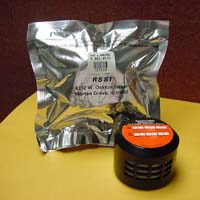Radon
Expand All Collapse All
- What is it?
- Symptoms
- First Aid
- Prevention
What is it?
What is radon?
Radon is a naturally occurring radioactive gas that can cause lung cancer. You cannot see or smell radon.
Radon is found in nearly all soil, and over time, it can move out of the soil and can enter a building through cracks or holes in the foundation. The radon can become trapped in the building and build up over time. You can also have radon in your water.
The only way to know if your home has radon is to test it.
Symptoms
What happens if there is radon in my home or building?
Most people exposed to radon will not have symptoms. However, long-term exposure can cause lung cancer. People with lung cancer may have:
- A cough that doesn’t get better or a bloody cough
- Trouble breathing
- Frequent lung infections like pneumonia or bronchitis
- Chest pain
If you smoke and there is radon in your home, your risk of lung cancer is even greater.
First Aid
What should I do if I’ve been exposed to radon?
If you think you have been exposed to radon for long periods of time, talk with your doctor or other health care provider. They may want to give you regular screenings for lung cancer.
Also talk with your doctor if you develop breathing trouble, an ongoing cough or other lung-related problems.
Prevention
What can I do to prevent radon exposure?
 Test your home and well water for radon.
Test your home and well water for radon.
- The EPA has general information about radon testing and how to get a radon test kit.
- If you live in Maine, you can order radiation tests directly from the state environmental testing laboratory.
- If you live in Vermont, you can order a free kit for testing your home from the Department of Health’s radon program by contacting 1-800-439-8550 or emailing radon@vermont.gov. You can order a water test kit from the Department of Health’s laboratory online or by calling 1-800-660-9997.
What can I do if I have radon in my home or well water?
Radon problems can be fixed. This should be done by an expert, registered contractor. Contact your state to learn more:
Last Updated: Wednesday January 18th 2017


 Test your home and well water for radon.
Test your home and well water for radon.



